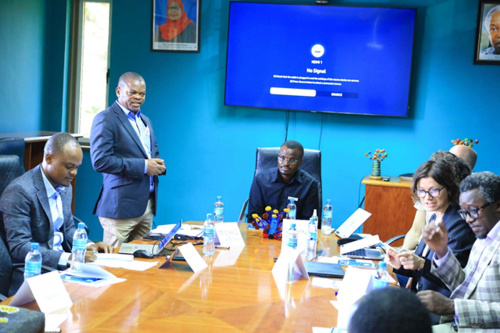Maiden voyage of Clinical Ethics Committee in Tanzania set at UDSM
By Jackson Isdory, CMU
The University of Dar es Salaam in collaboration with the University of Oslo and the University of Rwanda has launched the Tanzania's first-ever Clinical Ethics Committee at the Mbeya Zonal Referral Hospital recently.
This significant milestone is part of a five-year project titled "Enhancing Ethics and Integrity Capacity in Medical Research and Clinical Practice" (ETHIMED), running from January 2022 to December 2026 and generously funded by the Norwegian Partnership Programme for Global Academic Cooperation (NORPART).
The inauguration ceremony took place on February 5th at the Mbeya Zonal Referral Hospital. It is the first of its kind in Tanzania and represents a crucial step towards encouraging ethical standards in medical research and clinical perception and practice in the region.
Expressing his enthusiasm during the launch, the Director of Mbeya Zonal Referral Hospital, Dr. Godlove Mbwanji, said the launch of the Clinical Ethics Committee was a landmark achievement for the hospital and the entire healthcare fraternity in Tanzania.
“It emphasises our commitment to providing the highest standard of care while safeguarding the principles of ethics and integrity”, said Dr. Mbwanji.
Global collaboration for local impact
Dr Michael Lyakurwa, Head of the Department of Philosophy and Religious Studies at UDSM, said the ETHIMED project draws on the collaborative efforts of the Department of Philosophy and Religious Studies at the University of Dar es Salaam, the University of Oslo's Centre for Medical Ethics, and the University of Rwanda's Faculty of Medicine.
“This global collaboration brings together diverse perspectives and expertise to address the complex ethical challenges inherent in modern healthcare”, said Dr. Lyakurwa.
He further said that UDSM was grateful for the collaboration with the University of Oslo and the University of Rwanda, which brought a wealth of expertise to Tanzania. “It is a testament to the power of international partnerships in advancing medical ethics initiatives”.
He added that fundamental to the ETHIMED was the comprehensive training provided to committee members. This was facilitated by Clinical Ethics experts from the University of Oslo with over 25 years of experience serving on Clinical Ethics Committees.
“These experts have brought invaluable insights to the Tanzanian initiative and have ensured that the committee is well-equipped to navigate the ethical complexities of healthcare settings”, said Dr. Lyakuwa.
He mentioned the experts to include Prof. Bert Molewijk, Dr. Berit Hofset Larsen (Clinical Ethics Committee secretary of the University of Oslo Hospital), and Dr. Trygve Johannes Lereim Sævareid.
Commenting on the initiative Dr. Berit Hofset Larsen, from Norway, a country with clinical ethics committees in all public hospitals since the 1990s, said the project was a commendable effort to enhance the ethical capability of healthcare professionals.
“The formation of the Clinical Ethics Committee was a central step in promoting a culture of ethical reflection and management in medical practice including communication and reflection on ethical problems, providing advice on specific ethical challenges, and addressing issues related to resource allocation and prioritization”, noted Dr. Larsen.
The committee would discuss cases prospectively or retrospectively, arrange seminars for health care staff, and prepare guidelines for ethically challenging questions. This aims at contributing to an improved encounter between patients and their families with the hospital, ultimately fostering a healthcare environment that prioritises ethical considerations.


